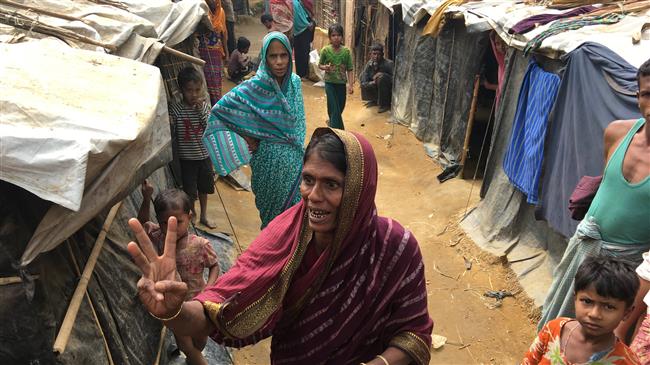UN launches $1 billion appeal for Rohingya refugees in 2018
The United Nations has launched an appeal for nearly one billion dollar to meet the urgent needs of Rohingya Muslims in Bangladesh, stressing the importance of establishing conditions for securing the safe return of those displaced.
UN agencies and NGO partners asked for $951 million through 2018 to provide basic needs of nearly 900,000 Rohingya Muslims in Bangladesh, including some 671,000 who have arrived in Bangladesh since August.
Backed by Myanmar’s government and Buddhist majority, the military launched yet another heavy-handed crackdown against the Muslim minority in Rakhine state on August 25, 2017, using a number of armed attacks on military posts as the pretext.
Only in its first month, the clampdown, called by the UN and prominent rights group an “ethnic cleansing campaign,” killed some 6,700 Rohingya Muslims, including more than 700 children, according to Doctors Without Borders.
Hundreds of thousands of Rohingya Muslims have fled the predominantly-Buddhist Myanmar to neighboring Bangladesh since August last year.
Read more:
- UN: Myanmar government destroying Rakhine's Rohingya Muslims
- UN experts slam Facebook for allowing hate material to spread against Rohingya in Myanmar
- UN expert says Myanmar's crackdown on Rohingya bears 'hallmarks of genocide'
Speaking to reporters in Geneva on Friday, the head of the UN refugee agency, Filippo Grandi, urged mobilizing life-saving aid for refugees, especially with the approaching monsoon season and rains and tens of thousands of people living in places at risk of landslides and floods.
“We are talking about truly critical needs here both on the part of the Bangladeshi communities who have so generously opened their doors, and of a stateless and refugee population that even prior to this crisis was among the world’s most marginalized and at risk,” Grandi said.
“The solutions to this crisis lie inside Myanmar, and conditions must be established that will allow refugees to return home. But today we are appealing for help with the immediate needs, and these needs are vast,” he added.
He once again emphasized that it "may take a very long time" before any Rohingya Muslim can return to their home in Myanmar's Rakhine state, in the absence of any evidence that they will be safe if they go back.
However, the UN refugee agency head said he would not stop fighting for the repatriation of those who wish to return home despite the current circumstances.
"I think it is very important to talk about the right of the Rohingya to return," Grandi said, adding that he "cannot entertain the notion" where their displacement is deemed permanent.
He pointed to the lack of conditions for the safe return of Rohingya Muslims and said discussions with Myanmar on repatriation "have been pretty basic, not very frequent (and) not very advanced."
But, he added, those talks "have continued."
"We have to take this thing one step at a time," the UN official said and added that humanitarian aid is needed while repatriation negotiations play out.
According to a new Associated Press report published on March 10, some 6,000 Rohingya Muslim refugees who have been displaced from their homes in Myanmar and are locked outside the border with Bangladesh are not willing to return home.
The report showed that many of refugees now living in squalid tents in no-man’s-land between Myanmar and Bangladesh have no intention of returning to their villages in Myanmar despite a deal between the two countries to have them relocated to their homes.
Bangladesh has refused to accept Rohingya Muslims now living in the borderland while Myanmar does not basically recognize the region as a no-man’s-land. Nyan Myint Kyaw, Myanmar's deputy commander of border police, said the refugees are still living in Myanmar’s territory.
The United Nations human rights chief on March 7 expressed strong suspicion that “acts of genocide” may have been carried out against Rohingya Muslims in Myanmar since August 2017.
Addressing the UN Human Rights Council, Zeid Ra’ad al-Hussein said reports about the bulldozing of sites in Myanmar pointed to a “deliberate attempt by the authorities to destroy evidence of potential international crimes, including possible crimes against humanity.”
Myanmar’s government rejects allegations of abusing the rights of minorities in the country, saying the United Nations’ findings on the issue are unreliable.
Israel indicts two settlers over suspected spying for Hezbollah
Iran: US airstrikes on Yemen war crimes, violation of international law
Yemeni armed forces down F-18 fighter jet, repel US-UK attack: Spokesman
Iran warns against US-Israeli plot to weaken Muslims, dominate region
VIDEO | Public uproar in US against Israeli regime
‘Ghost town’: 70% of Jabalia buildings destroyed by Israel
Mother’s Day: Sareh Javanmardi’s inspiring journey as Paralympic champion and mother
Russia downs over 40 Ukrainian drones as Putin vows 'destruction' on Kiev












 This makes it easy to access the Press TV website
This makes it easy to access the Press TV website